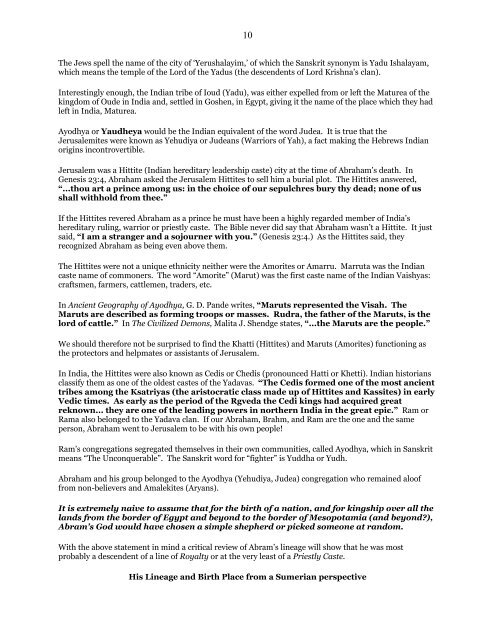Create successful ePaper yourself
Turn your PDF publications into a flip-book with our unique Google optimized e-Paper software.
The <strong>Jews</strong> spell the name <strong>of</strong> the city <strong>of</strong> ‘Yerushalayim,’ <strong>of</strong> which the Sanskrit synonym is Yadu Ishalayam,<br />
which means the temple <strong>of</strong> the Lord <strong>of</strong> the Yadus (the descendents <strong>of</strong> Lord Krishna’s clan).<br />
Interestingly enough, the Indian tribe <strong>of</strong> Ioud (Yadu), was either expelled from or left the Maturea <strong>of</strong> the<br />
kingdom <strong>of</strong> Oude in India and, settled in Goshen, in Egypt, giving it the name <strong>of</strong> the place which they had<br />
left in India, Maturea.<br />
Ayodhya or Yaudheya would be the Indian equivalent <strong>of</strong> the word Judea. It is true that the<br />
Jerusalemites were known as Yehudiya or Judeans (Warriors <strong>of</strong> Yah), a fact making the Hebrews Indian<br />
origins incontrovertible.<br />
Jerusalem was a Hittite (Indian hereditary leadership caste) city at the time <strong>of</strong> Abraham’s death. In<br />
Genesis 23:4, Abraham asked the Jerusalem Hittites to sell him a burial plot. The Hittites answered,<br />
“...thou art a prince among us: in the choice <strong>of</strong> our sepulchres bury thy dead; none <strong>of</strong> us<br />
shall withhold from thee.”<br />
If the Hittites revered Abraham as a prince he must have been a highly regarded member <strong>of</strong> India’s<br />
hereditary ruling, warrior or priestly caste. The Bible never did say that Abraham wasn’t a Hittite. It just<br />
said, “I am a stranger and a sojourner with you.” (Genesis 23:4.) As the Hittites said, they<br />
recognized Abraham as being even above them.<br />
The Hittites were not a unique ethnicity neither were the Amorites or Amarru. Marruta was the Indian<br />
caste name <strong>of</strong> commoners. The word “Amorite” (Marut) was the first caste name <strong>of</strong> the Indian Vaishyas:<br />
craftsmen, farmers, cattlemen, traders, etc.<br />
In Ancient Geography <strong>of</strong> Ayodhya, G. D. Pande writes, “Maruts represented the Visah. The<br />
Maruts are described as forming troops or masses. Rudra, the father <strong>of</strong> the Maruts, is the<br />
lord <strong>of</strong> cattle.” In The Civilized Demons, Malita J. Shendge states, “...the Maruts are the people.”<br />
We should therefore not be surprised to find the Khatti (Hittites) and Maruts (Amorites) functioning as<br />
the protectors and helpmates or assistants <strong>of</strong> Jerusalem.<br />
In India, the Hittites were also known as Cedis or Chedis (pronounced Hatti or Khetti). Indian historians<br />
classify them as one <strong>of</strong> the oldest castes <strong>of</strong> the Yadavas. “The Cedis formed one <strong>of</strong> the most ancient<br />
tribes among the Ksatriyas (the aristocratic class made up <strong>of</strong> Hittites and Kassites) in early<br />
Vedic times. As early as the period <strong>of</strong> the Rgveda the Cedi kings had acquired great<br />
reknown... they are one <strong>of</strong> the leading powers in northern India in the great epic.” Ram or<br />
Rama also belonged to the Yadava clan. If our Abraham, Brahm, and Ram are the one and the same<br />
person, Abraham went to Jerusalem to be with his own people!<br />
Ram’s congregations segregated themselves in their own communities, called Ayodhya, which in Sanskrit<br />
means “The Unconquerable”. The Sanskrit word for “fighter” is Yuddha or Yudh.<br />
Abraham and his group belonged to the Ayodhya (Yehudiya, Judea) congregation who remained alo<strong>of</strong><br />
from non-believers and Amalekites (Aryans).<br />
It is extremely naive to assume that for the birth <strong>of</strong> a nation, and for kingship over all the<br />
lands from the border <strong>of</strong> Egypt and beyond to the border <strong>of</strong> Mesopotamia (and beyond?),<br />
Abram’s God would have chosen a simple shepherd or picked someone at random.<br />
With the above statement in mind a critical review <strong>of</strong> Abram’s lineage will show that he was most<br />
probably a descendent <strong>of</strong> a line <strong>of</strong> Royalty or at the very least <strong>of</strong> a Priestly Caste.<br />
10<br />
His Lineage and Birth Place from a Sumerian perspective


